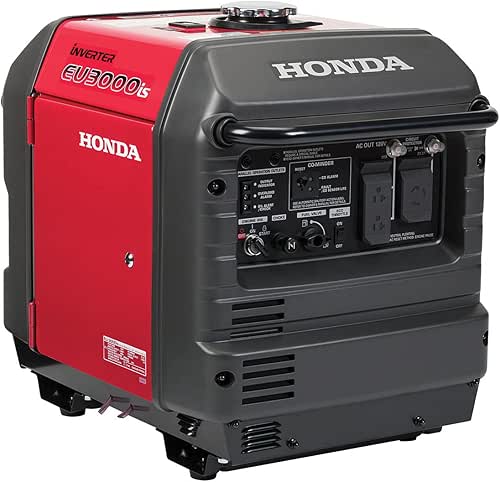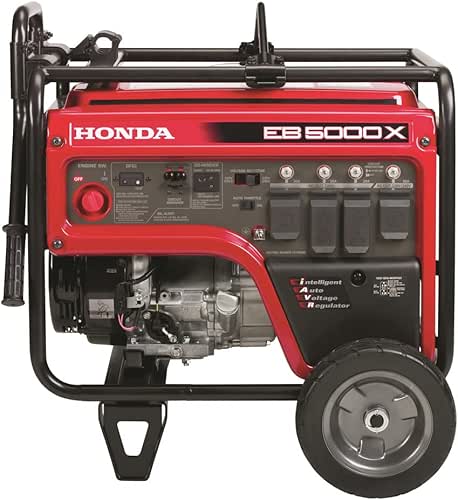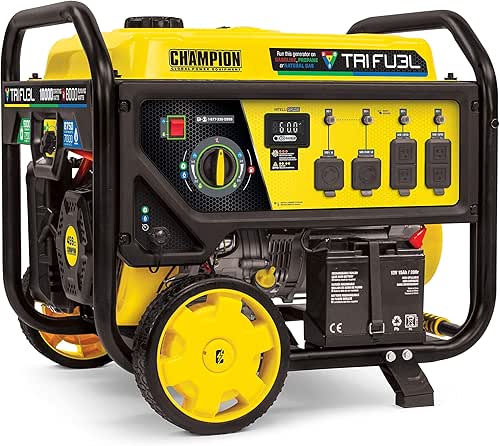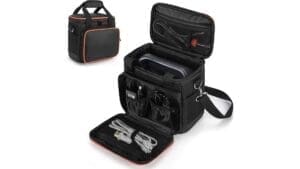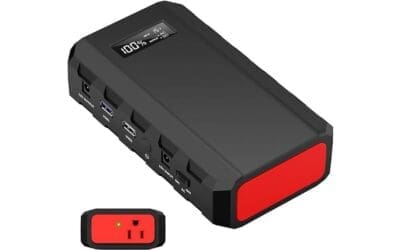If you're concerned about the hassle of lugging around heavy equipment, portable generators offer a solution that might surprise you. Imagine having a reliable power source at your fingertips whenever you need it, whether you're camping, working on a DIY project, or facing a power outage. But have you ever wondered how to pick the right size generator or the essential safety precautions to keep in mind? Stay tuned to discover the key factors to ponder and expert tips that will help you make the most of your portable generator's potential.
Key Takeaways
- Portable generators offer convenient power on-the-go for various appliances and tools.
- Proper maintenance, including fuel stabilizer and oil changes, ensures reliable performance.
- Short-term storage involves cleaning debris off the unit after each use.
- Long-term storage requires filling the tank with fuel and adding a stabilizer for extended periods.

Benefits of Portable Generators
Portable generators offer a convenient and flexible power solution for various situations, making them a valuable asset to have on hand. When it comes to emergency preparedness, having a portable generator can be a lifesaver. In times of power outages or natural disasters, you can rely on your generator to keep essential appliances running, providing light, warmth, and a means to charge devices. Additionally, for camping enthusiasts, portable generators are essential camping gear. They allow you to power lights, electric stoves, and even charge your devices while enjoying the great outdoors. With their ease of use and portability, these generators thus keep you prepared for any situation, making them a must-have for both emergency preparedness and camping essentials.
Types of Portable Generators
When contemplating portable generators, understanding the various types available can help you select the most suitable option for your specific needs and situations. Two key factors to take into account are fuel efficiency comparisons and noise level analysis. Different types of portable generators vary in fuel efficiency, affecting how long they can run on a specific amount of fuel. Noise level analysis is essential for determining how quietly a generator operates, which can be critical in noise-sensitive environments. In your search for a portable generator, compare the fuel efficiency ratings and noise levels of different models to find one that meets your power needs while also being efficient and quiet. This knowledge will empower you to make an informed decision when choosing a portable generator.
Wattage Considerations for Generators
Considering the wattage requirements for generators is essential when determining the appropriate power output for your specific needs. Calculating power needs involves identifying the total wattage of all devices you plan to connect to the generator simultaneously. It's critical to choose a generator with a rated power output that meets or exceeds this total wattage to make certain all devices can run smoothly. Generator efficiency plays a significant role in determining the power output needed. Be mindful of the efficiency rating, as it indicates how effectively the generator converts fuel into electricity. Here is a table to illustrate wattage considerations:
| Appliance | Estimated Power Consumption (Watts) |
|---|---|
| Refrigerator | 600 |
| Microwave | 1000 |
| Lights (x5) | 300 |
Portable Generator Safety Tips
To guarantee safe operation of your portable generator, prioritize understanding and implementing essential safety tips. Safety precautions are important to prevent accidents and ensure smooth functioning. First and foremost, never operate a generator indoors or in enclosed spaces to avoid carbon monoxide poisoning. Keep your generator dry and position it on a dry surface to prevent electric shocks. Before refueling, turn off the generator and let it cool down to avoid fires. Regularly inspect the generator for any damage and follow the manufacturer's maintenance instructions. In case of emergencies, have a fire extinguisher nearby and know how to shut off the generator quickly. Practicing these safety measures will enhance your emergency preparedness and keep you safe while using your portable generator.

Essential Accessories for Portable Generators
Enhance the functionality and efficiency of your portable generator by equipping it with essential accessories. When investing in accessories for your portable generator, consider the following:
- Generator Covers: Guarantee protection for your generator from dust, dirt, and moisture with a durable cover designed specifically for your model.
- Extension Cords: Assure flexibility in powering devices by having a variety of extension cords of different lengths and gauges.
- Fuel Storage & Maintenance Kits: Securely store extra fuel for emergencies and consider purchasing maintenance kits that include oil, spark plugs, and filters for regular upkeep. These kits are essential for prolonging the lifespan of your generator and keeping it in top condition.
Selecting the Right Generator Size
When selecting the right generator size, make sure it matches your power needs to maximize efficiency and performance. Calculating power needs accurately is essential to avoid overpowering or underpowering your devices. Consider the starting wattage and running wattage of all appliances you plan to connect simultaneously. Larger appliances like refrigerators or air conditioners require more starting watts than smaller electronics. Below is a comparison table to help you understand the generator size range and its suitable applications:
| Generator Size | Power Output (Watts) | Suitable Applications |
|---|---|---|
| Small | 1,000 - 3,000 | Charging devices, lights |
| Medium | 3,100 - 6,000 | Refrigerator, microwave |
| Large | 6,100 - 10,000 | Sump pump, air conditioner |
Maintenance Checklist for Portable Generators
Regularly maintaining your portable generator guarantees its reliability and longevity, keeping it ready for immediate use when needed. To make sure top performance, consider the following maintenance checklist:
- Fuel Storage: Properly store your generator with an empty fuel tank if not frequently used.
- Winter Preparation: Before winter sets in, fill the tank with fuel for longer storage periods and add a gasoline stabilizer like Briggs & Stratton® 5-in-1 Advanced Formula Fuel Treatment and Stabilizer.
- Oil Maintenance: Regularly change the generator oil to make sure smooth operation. Check oil levels using the dipstick and fill to the full marker. Additionally, inspect and replace the carburetor, air filter, fuel filter, and spark plug as needed.
Top Brands for Portable Generators
To explore the top brands for portable generators, contemplate reputable manufacturers known for their quality and reliability in providing power solutions. When it comes to generator reliability, Honda is a standout brand, recognized for its durable and long-lasting generators that offer consistent power output. Another top brand to contemplate is Champion, which combines performance with affordability, making it a popular choice among users. For those seeking fuel efficiency, Yamaha generators are well-regarded for their eco-friendly designs that prioritize energy conservation without compromising on power. Additionally, Generac is a trusted name in the industry, offering a wide range of portable generators known for their fuel efficiency and reliability, making them a top choice for various power needs.
Portable Generator Usage Tips
For best performance and safety when using a portable generator, make sure you follow these practical usage tips.
- Emergency Power: Always keep your generator well-maintained and fueled in case of power outages.
- Camping Essentials: Pack your generator along for camping trips to power up lights, cooking appliances, and electronic devices.
- Noise Consideration: Be mindful of noise levels when running your generator, especially in camping grounds or residential areas.
Some Final Thoughts
Now that you have learned about the benefits, types, safety tips, and maintenance checklist for portable generators, you are ready to power up anywhere with ease. Remember to choose the right generator size, follow safety precautions, and keep up with maintenance to guarantee peak performance. With the convenience and flexibility of portable generators, you can confidently take on any power outage or outdoor adventure. Get ready to stay powered up wherever you go!
Some Questions & Answers

Can Portable Generators Be Used Indoors?
You should never use portable gasoline generators indoors for safety reasons. Indoor usage can lead to carbon monoxide poisoning, as these generators emit toxic fumes. It's important to follow noise regulations and guarantee proper ventilation when operating a generator. To maintain a safe environment, always place the generator outdoors in a well-ventilated area, away from doors and windows. Remember, safety first when it comes to using portable generators. For this use-case, choose a solar generator.
What Is the Average Lifespan of a Portable Generator?
To guarantee a long lifespan for your portable generator, follow these maintenance tips. Regularly replace the oil and inspect/replace filters and spark plugs. Store with an empty fuel tank if not used often, using a fuel stabilizer to prevent gum formation. Common issues include neglecting maintenance, leading to engine problems. By following these steps, you can maximize the average lifespan of your portable generator.
How Do You Safely Dispose of Old Generator Oil?
When disposing of old generator oil, consider recycling options for minimal environmental impact. To do this safely, locate a recycling center that accepts used oil. Never pour oil down drains or onto the ground. Transport the oil in a sealed container and follow local regulations for disposal. Recycling old oil helps protect the environment by preventing contamination of soil and water sources. Always prioritize eco-friendly practices when handling hazardous materials.
Are There Any Environmental Concerns With Using a Portable Generator?
When using a portable generator, it's crucial to contemplate environmental impacts. Noise pollution may arise from the generator's operation, and emissions can affect air quality. To minimize your carbon footprint, opt for generators with lower emission levels. Proper maintenance, like changing oil and filters regularly, can help improve efficiency and reduce environmental harm. Always prioritize eco-friendly practices to guarantee minimal impact while enjoying the convenience of portable power.
Can Portable Generators Be Used in Extreme Weather Conditions?
In extreme weather conditions, portable generators boast extreme portability and weather resistance. These features make them reliable during storms or emergencies. Their compact design allows for easy transportation, while sturdy construction guarantees durability in harsh environments. Consider models with reinforced casing and weatherproof outlets for enhanced performance. Always follow safety guidelines to maximize your generator's efficiency and protect against potential hazards.

